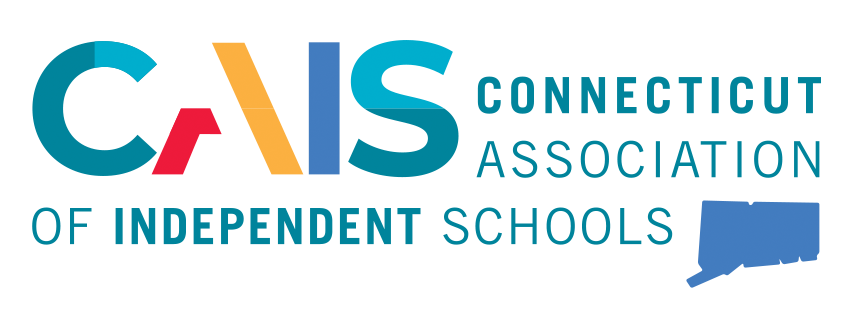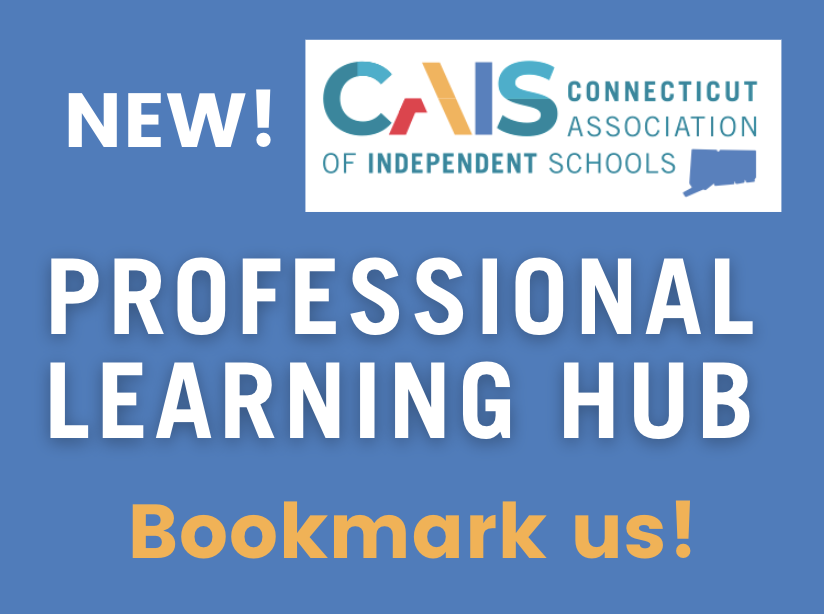
A night of sharing and discussion surrounding the topic of teaching mathematics in independent schools.
Where: Hamden Hall Country Day School, Hamden, CT
When: Thursday, February 6, 2025 || Snow date -- Thursday, February 13, 2025
Who: Mathematics educators and others interested in mathematics education
How: Register below; $70 per person, CAIS member school | $85 non-member school
SCHEDULE
4:30 Registration, Refreshments & Conversation
5:00 Welcome & Introduction
5:10 - 5:30 Low-Floor High-Ceiling Random Walk, Amy Bigelow, Franklin Academy
5:35 - 5:55 Concrete & Multisensory: Walking the Number Line, Max Sage-Robison, Villa Maria
Khanmigo: An AI Tool for Streamlined Teaching, Michael Gustin, Hamden Hall
6:00 - 6:40 Dinner
6:40 - 7:00 A Language-Based Approach to Math Story Problems, Barbara McHale & Kelly Scopelliti, Eagle Hill School
Making Connections: A Pattern-Based Approach to Function Transformations, Lauren Riva & Andrew Wood, Loomis Chaffee School
7:05 - 7:30 Prime Suspects: Mathematical Guess-Who, Emily Dyckman, St. Luke's School
Mathematics Instruction Using an Inquiry Model, Eleanor Strumolo, Renbrook School
7:35 - 7:55 Exploring Math Through Magic, Jon Matte, Greens Farms Academy
Desserts & Coffee served through final presentations
SESSION DESCRIPTIONS
5:10 p.m.
Low-Floor High-Ceiling Random Walk
Start the evening with a demonstration of Ralph Pantozzi's award-winning "Random Walk" lesson, which creates a human simulation of a binomial distribution. The lesson helps create an episodic memory for basic probability and a physical experience for understanding basic combinatorics, while also introducing normal distribution.
5:35 p.m.
Concrete & Multisensory: Walking the Number Line
Learn how to use a physical walking number line to support students who struggle to understand the abstract concepts of mathematics. The exercise will demonstrate strategies to help diversify a student's math vocabulary and broaden their understanding of how language applies to mathematics, as well as help them learn how to engage in complex, multi-step word problems that stay within the realm of addition & subtraction within 20. Geared toward lower school.
Khanmigo: An AI Tool for Streamlined Teaching
In this session, we will explore how Khan Academy's AI-powered assistant, Khanmigo, can transform teaching by streamlining lesson planning, quiz creation, rubric generation, and more. We will work through some practical examples of how to use the tool effectively to save time and enhance instructional quality. Whether you're new to AI tools or a seasoned tech-savvy educator, this session will provide actionable insights and tips to seamlessly integrate this free tool into your teaching workflow.
6:40 p.m.
A Language-Based Approach to Math Story Problems
This session demonstrates a language-based approach to math story problems that helps students develop their own concrete, pictorial and/or abstract model through the use of visualization and language-based strategies. Geared toward lower and middle school.
Making Connections: A Pattern-Based Approach to Function Transformations
This presentation will share one model of teaching transformations of functions by focusing on identifying and analyzing patterns in parent functions. This method encourages active exploration and fosters meaningful connections, making complex concepts more accessible and engaging. Geared toward upper school.
7:05 p.m.
Prime Suspects: Mathematical Guess Who
This presentation invites you into an interactive game of mathematical Guess Who that works well with parent functions lessons or function transformations, but could easily be adapted for shapes in geometry, graphed lines in Algebra 1, and sine/cosine functions in precalculus, as well as to lessons with younger students. This activity helps students put what they have learned into words and narrow in on the defining characteristics of a particular concept.
Mathematics Instruction Using an Inquiry Model
Wondering how to incorporate an inquiry model into the mathematics classroom? This presentation includes a demonstration of several inquiry-based resources, such as 3-Act Tasks, Notice and Wonder, and Open Up Resources; pedagogical approaches; and one or more larger projects that incorporate an inquiry model (Wonder, Explore, Plan, Create, Share). Geared toward middle school.
7:35 p.m.
Exploring Math Through Magic
Join Jon Matte as he shows us how he introduces students to a number of mathematical concepts using magic as a backdrop. Jon will end the evening with a sample trick that shares the love of recreational mathematics through the lens of magic.


 Prev Month
Prev Month View Month
View Month Search
Search Go to Month
Go to Month Next Month
Next Month

 Export Event
Export Event 


